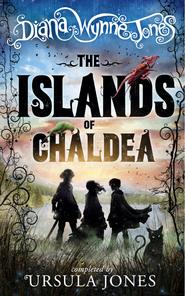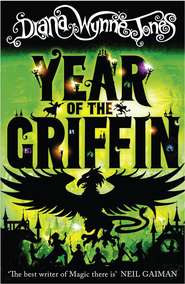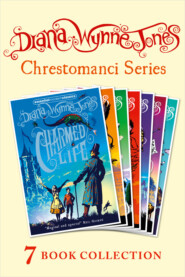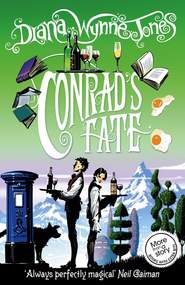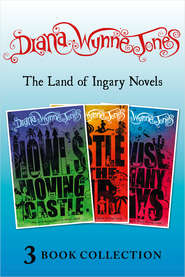По всем вопросам обращайтесь на: info@litportal.ru
(©) 2003-2024.
✖
The Time of the Ghost
Настройки чтения
Размер шрифта
Высота строк
Поля
She followed her own arrows round the walls, drifting through beds and a chair in order to look closely at the pictures. Cart had signed all hers with a flourishing “Charlotte”. Imogen had signed some of hers neatly, “I. Melford”, but not all. Sally could not tell which of the rest were Imogen’s, or which were her own – if any. Then there were three signed “WH”, including one of the oil paintings, and several labelled simply “N”. N’s pictures leapt off the page at you, even though N could not draw. There was a drawing of Oliver N had done, which was a bad drawing of a bad drawing. But it was Oliver to the life, in spite of it.
I simply don’t remember any of these! Sally said. A view of the shop-cottage, unsigned. The dead elms, with blodgy rooks, also unsigned. A splendidly dismal dream-landscape by Cart. Cart went in for funereal fantasies: a coffin carried past a ruined castle in a black storm; cowled monks burying treasure; and a horrendous one of a grey, bulky maggot-like thing rising out of mist in a meadow. That one made Sally shudder and pass on quickly. Imogen, on the other hand, seemed to paint more strictly from life: flower studies, fields of wheat, and a careful drawing of the kitchen sink, piled full of thick crockery. That seemed very like Imogen. She could hear Imogen at that moment: “But I must face facts, Cart. It doesn’t matter how unpleasant they are. I can’t turn my back on reality.”
“Why can’t you?” Cart demanded. “It seems to me that enough facts come up out of life and hit you, without you going and facing all the other ones. Why can’t you turn your back on a few?”
“Don’t you see? It’s a matter of Truth and Art!” Imogen declared. The strong note of hysteria was in her voice.
Sally signed and turned to the next picture in the row. And laughed. Oliver seemed to hear her. He rumbled hard from the bottom of the stairs. Sally was laughing too much to care. The picture was signed “And Fenella did just this one awful one”. The picture was a terrible wicked jumble of everyone else’s. N’s badly drawn Oliver snuffled at Cart’s cowled monk, who fled for protection past WH’s spaceship to Imogen’s sink piled with crockery, where – Sally found she remembered this one all right. It was a large, simpering Mother figure, stretching out both arms towards the sink.
She made tracings, the little beast! Sally said.
The Mother was the next painting. She was stretching out her arms, not to a sink, but to a fat simpering baby. Sally could remember painting this. And it was awful. It embarrassed her, it was so bad. The faces simpered, the colours were weak and bad, and the shapes were floppy and pointless. The Mother was like an aimless maggot with a pretty face on top. Sally could even remember the row she and Cart had had over it. “Oh leave it out, for goodness sake!” Cart had yelled. “It’s fat and squishy! It’s absolutely yuk!”
And Sally had yelled back, “You’re the one who’s yuk! You don’t know a tender emotion when you see one. You’re afraid of feelings, that’s your trouble!” That was true in a way, about Cart. Cart’s body may have been large and blurred, but she tried to keep her mind like a small walled garden. She would let no wild things in – though she was ready enough to let them out if it suited her. Sally’s talk of tender emotions drove Cart wild at once.
“Don’t give me that sentimental drivel!” she roared, and she had chased Sally round the bedroom, waving a coat-hanger.
Cart was saying much the same at the moment to the sobbing Imogen, though she said it in a kinder way. “Imogen, really, I do think you’re working all this up out of nothing.”
“No, I’m not! What good would a letter do? A letter, when my whole personality is at stake!” Imogen rang out dramatically.
Oh! said Sally. She had quite forgotten she was looking for a letter. It was awful the way her mind seemed to point to only one thing at once. It was like the narrow beam of a torch.
The obvious place to look was in the old bureau wedged in the corner. Its top had been cleared for the Exhibition and pictures propped on top of it. But it had four drawers below, one for each of them. Sally, of course, could not open the drawers, but that was not exactly a problem in her condition. She lowered herself at the bureau and pushed her face into the top drawer.
This drawer was Cart’s. It was dark in there, but light came in through the keyhole – and through Sally – so that she could see. There was nothing to see. Cart had cleared the drawer out along with the top of the bureau. Sally remembered her doing it now. Cart had said, “I shall put away childish things.”
“Pompous ass,” said Fenella.
Nevertheless, Cart had thrown everything away – stamp collection, raffia, modelling clay, old drawings, the maps and lists of kings from her imaginary country, and the rude rhymes about her teachers – and had kept only schoolbooks. “I do O levels next year,” she told the others. They felt the importance of that.
One exercise book of a childish nature had survived, however. That, when Sally moved her face down into the next drawer, was lying on top of the jumble of her own things. It was pale green and labelled The Book of the Worship of Monigan. It was there because Sally must have begged it off Cart. Sally wished vaguely that she remembered what was in it, but she could not, and there was no way she could think of to get it open. As for the rest of the things, Sally found herself exclaiming, What on earth do I keep all this junk for? If it had been possible, she would have done as Cart had and thrown the lot away. Pencils, rubbers and scissors she could see the use of, but why had she kept six broken necklaces and half a cardboard Easter egg? What was the pink seaside rock doing, stuck to somebody’s old sock? Whose was the button carefully wrapped in tinfoil? And who wanted a collection of old hens’ feathers?
Among all this, there was no sign of a letter. The only paper was a drawing she had done when she was six, now covered all over with the scores of a card game. A, N, J and S had played. J had won every game.
Sally sank lower still to push her face into Imogen’s drawer. It was full of piano music, stuffed so full that Sally had trouble seeing more than the first layer. The lower she sank, the darker it became. But it was clear that this drawer was devoted to Imogen’s career.
“My career,” Imogen said at that moment, “is in ruins!”
“If that’s what you call looking facts in the face,” said Cart, “I’m going away.”
“I don’t think you believe in Truth,” Imogen said reproachfully. At least she had stopped crying now.
“Rather hard not to, don’t you think?” said Cart.
Typical of both of them, Sally thought. Cart, walling herself in, buttoning up, making a joke of things, refusing to let Imogen have feelings – though there was a case for it over Imogen, Sally had to admit. Imogen’s feelings were vast and continuous.
Fenella’s drawer was full of dolls, packed in a dirty jumble, and the remains of several dolls’ tea-sets. Sally was a little touched. Fenella had, in a way, put away childish things too. She no longer played with dolls, even if she could not bear to throw them away. There was a piece of paper on top. “Poem,” it said, “by Fenella Melford.”
I have three ugly sistersThey really should he mistersThey shout and scream and play the pianoI can never do anything I want.
The poem had been written at school. The teacher had written underneath, “A poem should be about your deeper feelings, Fenella.” And Fenella had written under that: “This is.”
Nothing here, Sally said. She came out of the bureau and floated face down at floor level, staring at the worn-out pattern of the rug. It looked like Oliver’s tufty coat, except that the pattern was in orange triangles. Imogen hated that rug. She said it offended her. Fenella called it the Rude Rug after that. There must be a letter. Sally was now quite sure there had been. She began floating to more her usual height, and stopped, with her torch-beam attention fixed on the wastepaper basket beside the bureau. It was stuffed and mounded with papers.
Ah! said Sally.
She dived towards it like a swimmer in her eagerness. And there, sticking sideways out of the top, was a sheet of blue writing paper with round, ragged writing on it which could well be hers.
“Dear Parents,” she read. “When you find this I shall be far away from here.”
There was no more, nothing but a doodled drawing of a face. Sally guessed she must have drawn it while she was thinking what else to say. Then of course she could not use that paper. The real letter must be elsewhere.
But where was I going? What was I doing? she wondered frantically.
Desperately, she pressed her face down among the other papers. Thank goodness! Here was another, on paper decorated with roses this time.
“Dear Parents, This is to inform you that I have taken …” Taken what? Sally wondered: the family jewels, a short holiday, leave of her senses? She had no idea. But here was more rosy paper.
“Dear Parents, Let me break this to you gently. I have decided, after much thought, that life here has little to offer me. I have …”
I think I was going to run away from home, Sally said. But I don’t think I had anywhere to go. Both grannies would send me hack at once. Why didn’t I say more? Oh, here’s another one.
“Dear Parents, My life is in ruins and also in danger. I must warn …”
Shaken, Sally withdrew her face from the basket and hovered like a swimmer treading water, staring at the papers. So there had been clanger. That matched her feelings of an accident, though not her feeling that something had gone wrong. But what danger, and where from? And now she came to look, the whole top of the waste basket was packed with the same rosy writing paper. She must have used the whole packet, trying to explain whatever it was to Phyllis and Himself. Perhaps if she read every single one, together they would tell her what had happened. She plunged her face among the papers again.
But it was impossible; they were packed in so tightly, some sideways and some upside down, some rolled into balls, some torn in half, and all so mixed up with old drawings and things Cart had thrown out, that Sally’s bodiless eyes could pick out hardly any of it. The ones she did see were only variations on the first four. And it got darker – too dark to read – more than four packed layers down. It was the merest luck that, when Sally was about to emerge from the basket and give up, her sight came up against a larger paper wedged upright against the side of the basket. At the top was her own writing – the now-familiar “Dear Parents” – but the next line was, to Sally’s wonder, in writing that had to be Cart’s. Cart’s writing was neat and unmistakable.
“We think Sally has come to a sticky end.”
Underneath that, the spiny writing with the angrily crossed Ts was surely Imogen’s. Sally brought her face up, backed away, and drove in again, right through the basket and the papers, so that her non-eyes were right up against the paper. It was dim, yellowish gloom, nearly too dark to see.
“Her bed has not been slept in and we have not seen her since—” Imogen had written. It was too dark to see any more. All Sally could gather was that Cart’s writing and Imogen’s alternated, line by line, all down the page, from yellowish brown gloom to night black. Horribly frustrated, Sally backed out and hovered.
I am going to see that letter!
There was a deal of noise downstairs. Imogen had seemed calmed by Cart, but, in the irritating way it had, her grieving now sprang up again like a forest fire, loud and wild, in a new place.
“But don’t you see, I may be using these difficulties as an excuse to hide the truth from myself! I’m hiding away behind them! I know I am!”
“Now Imogen,” Cart said soothingly. “I think that’s just tormenting yourself.”
Oh shut up! Sally called out. Imogen enjoys grieving. She doesn’t need sympathy, she needs shaking. It’s me that needs the sympathy!
Furiously, she threw herself at the heaped wastepaper basket. She went right through, and found herself looking at the wallpaper beyond. But she was so determined that she backed away and threw herself forward again, and again, and again. She still went right through, but, ever so slightly, the basket rocked. The papers rattled and crunkled. Oh good! said Sally. She threw herself at it once more. There was such a rustling that Oliver started to growl again. But Sally knew she was making some impression. If I try hard, she said. Trying does it. I am made of something after all. I’m not quite nothing. I’m probably made of the life stuff that was all round the boys. I shall think of myself like that. Bash, slide, crunkle. Sally thought of herself as strong, crackling, flexible, forceful, and bashed forward again. Bash, crunkle, crunkle.
She had done it. Instead of going into the basket, she was bounced off from it. The basket, already swaying, swung sideways, tipped and fell heavily, sending a slither of paper out across the Rude Rug. Oliver’s growls rose to sound like a small motorbike.






